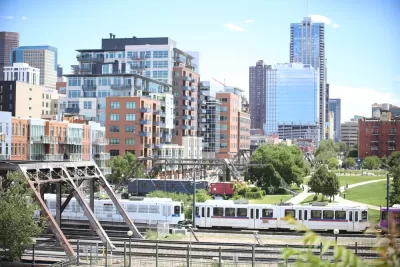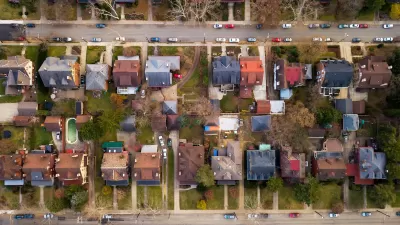A proposal to reduce parking requirements near transit and encourage higher-density affordable housing development received Planning Board approval, but community concerns about affordability and displacement remain.

"The Denver Planning Board voted 8-0 on Wednesday to forward the 'Expanding Housing Affordability' policy to the City Council and recommend that the council adopt it," but as Joe Rubino reports, the plan remains hotly debated.
The plan has faced criticism for reducing parking requirements for new developments in "transit-rich areas," prompting the city to narrow down eligibility to projects within a quarter mile of a transit stop. "All projects that meet the affordable housing requirements remain eligible for smaller reductions in the number of parking spaces they have to provide on-site, but the full exemption is now much more limited."
Other opponents worry that the proposal, which only applies to buildings with 10 or more units, doesn't go far enough to address affordability issues in parts of the city not zoned for larger multifamily buildings. "Instead, it will concentrate the affordable units in neighborhoods already under intense development pressure unless the city changes its zoning code to open up more neighborhoods for higher-density housing," critics say.
Two members of the advisory committee that helped develop the plan, Ean Tafoya of the Colorado Latino Forum and Nola Miguel of the Globeville, Elyria-Swansea Coalition Organizing for Health and Housing Justice, oppose it on the grounds that the policy's "affordability requirements don’t go deep enough to be attainable to people living in neighborhoods vulnerable to economic displacement like Globeville and Elyria-Swansea, and that there isn’t a strong mechanism to compel developers to build multi-bedroom units that could house families."
FULL STORY: Denver’s proposed affordable housing mandate advances despite concerns over equity, parking requirements

Maui's Vacation Rental Debate Turns Ugly
Verbal attacks, misinformation campaigns and fistfights plague a high-stakes debate to convert thousands of vacation rentals into long-term housing.

Planetizen Federal Action Tracker
A weekly monitor of how Trump’s orders and actions are impacting planners and planning in America.

San Francisco Suspends Traffic Calming Amidst Record Deaths
Citing “a challenging fiscal landscape,” the city will cease the program on the heels of 42 traffic deaths, including 24 pedestrians.

Defunct Pittsburgh Power Plant to Become Residential Tower
A decommissioned steam heat plant will be redeveloped into almost 100 affordable housing units.

Trump Prompts Restructuring of Transportation Research Board in “Unprecedented Overreach”
The TRB has eliminated more than half of its committees including those focused on climate, equity, and cities.

Amtrak Rolls Out New Orleans to Alabama “Mardi Gras” Train
The new service will operate morning and evening departures between Mobile and New Orleans.
Urban Design for Planners 1: Software Tools
This six-course series explores essential urban design concepts using open source software and equips planners with the tools they need to participate fully in the urban design process.
Planning for Universal Design
Learn the tools for implementing Universal Design in planning regulations.
Heyer Gruel & Associates PA
JM Goldson LLC
Custer County Colorado
City of Camden Redevelopment Agency
City of Astoria
Transportation Research & Education Center (TREC) at Portland State University
Jefferson Parish Government
Camden Redevelopment Agency
City of Claremont





























